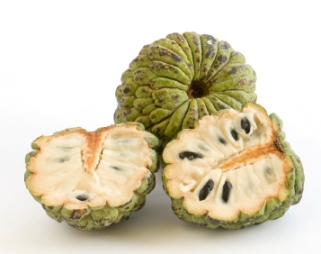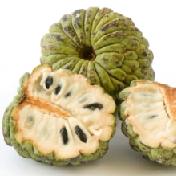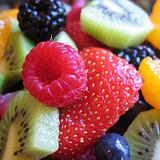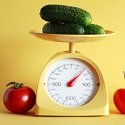Cherimoya Nutrition Facts, Health Benefits of Cherimoya
All about cherimoya nutrition facts, cherimoya benefits, calories in a cherimoya, cherimoya nutrients
The Cherimoya is a green fruit, similar in size to a grapefruit and native to central and southern America, it is also nicknamed the ice-cream fruit or custard apple due to its creamy texture. The Cherimoya is high in carbohydrates, nearly 18% of the fruit. It is low in fat and contains no cholesterol. Whilst not as low in calories as some other fruits, it is still only 75 calories per serving (100g or 3.5oz).
According to the US Department of Agriculture (USDA), this fruit contains 19g of sugar per serving (100g or 3.5oz). It is also packed with vitamin C, providing one fifth of our daily recommended intake, and therefore boosting our immune systems. The fruit also contains potassium which is believed to help protect against cardiovascular disease and our kidneys, and vitamin B6 which is thought to reduce the risk of Parkinson disease.

Do not eat the Cherimoya seeds as they are very toxic. Remove all seeds from the fruit as you eat it.
When
purchasing this fruit, if it is not fully ripe, keep at room
temperature until it has a small amount of give, similar to an avocado.
The fruit can then be eaten or refrigerated, but don’t wait too long as
it will go off quickly.
Compare Cherimoya nutrition facts to the other fruits.
Nutritional Value of Cherimoya
| Cherimoya nutritional value per 100 g (3.5 oz) Refuse: 31% (Seeds, skin and core Scientific Name: Annona cherimola |
|
|---|---|
| Proximates: | |
| Water | 79.39 g |
| Energy | 313 kJ (75 kcal) |
| Protein | 1.57 g |
| Carbohydrates | 17.71 g |
| Total Fat: | 0.68 g |
| Fiber | 3.0 g |
| Cholesterol | 0 mg |
| Minerals: | |
| Calcium, Ca | 10 mg (1 %) |
| Iron, Fe | 0.27 mg (2 %) |
| Magnesium, Mg | 17 mg (4 %) |
| Phosphorus, P | 26 mg (3 %) |
| Potassium, K | 287 mg (6 %) |
| Sodium, Na | 7 mg (0.3 %) |
| Zinc, Zn | 0.16 mg (1 %) |
| Copper, Cu | 0.069 mg (3 %) |
| Manganese, Mn | 0.093 mg (5 %) |
| Vitamins: | |
| Vitamin C | 12.6 mg (21 %) |
| Thiamine (Vit. B1) | 0.101 mg (7 %) |
| Riboflavin (Vit. B2) | 0.131 mg (8 %) |
| Niacin (Vit. B3) | 0.644 mg (3 %) |
| Pantothenic acid (B5) | 0.345 mg (3 %) |
| Vitamin B6 | 0.257 mg (13 %) |
| Folate (Vit. B9) | 23 mcg (6 %) |
| Vitamin A | 5 IU (0.1 %) |
| Vitamin E | 0.27 mg (1.4 %) |
| Percentages are relative to US Recommended Daily Intake (RDI) for adults. | |
Author: Lana Soko
You Might Also Like:
Like This Page?
|
Share This Page:
|







